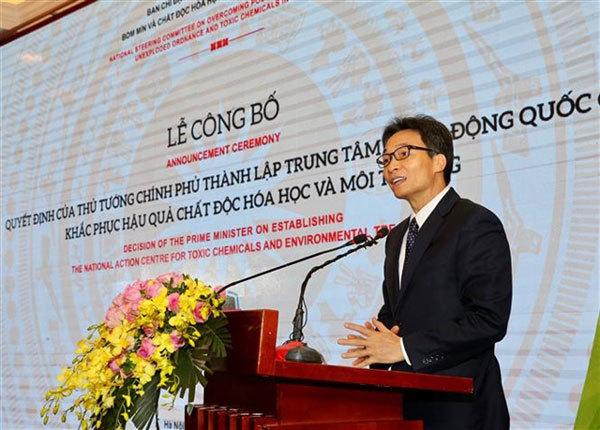 |
| Deputy Prime Minister Vu Duc Dam speaks at the ceremony. VNA/VNS Photo Duong Giang |
In July, Prime Minister Nguyen Xuan Phuc signed the decision to establish the NACCET.
The organisation will be responsible for running tasks to overcome the post war consequences of chemical toxins to environment and humans; handling pollution of toxic chemicals and hazardous substances, overcoming incidents of toxic chemicals and environment nationwide; and building and managing a database on overcoming post war consequences of toxic chemicals.
Ha Van Cu, General Director of the NACCET, said while the war had ended long ago, its consequences remained.
“Tackling post-war toxic chemicals and carrying out activities to ensure security and safety of the environment is an urgent and long-term task. It is both a humanitarian task and a task to ensure the sustainable and prosperous development of the country,” Cu said.
Incidents like the recent mercury pollution and water safety issue in Hanoi showed the increasing risk of chemical pollution, he said.
“Threats to environmental security have been increasing in terms of scale and seriousness in the past year,” he said.
Speaking at the ceremony, Deputy Prime Minister Vu Duc Dam emphasised the importance of establishing the NACCET.
“There still remains a huge amount of dioxin-contaminated land in Vietnam, millions of toxic chemicals in the soil, millions of people who suffered from dioxin contamination after the war. That’s a problem we need to deal with,” Dam said.
He also said that like many in other countries, environmental protection had been neglected for a while.
“The need to address pollution and chemicals detoxification is urgent,” he said, adding that the establishment of the NACCET is timely.
He asked the centre leaders to focus on human resources and technology investment, while also calling on international organisations to support Vietnam on the issue.
Speaking at the event, Caryn McClelland, deputy chief of mission at the US Embassy in Hanoi, said the US was committed to supporting the development of Vietnam.
“Last year, the USAID committed a funding of US$183 million for the initial five years of the dioxin remediation project at Bien Hoa Airport. This is the largest remaining hotspot of dioxin contamination in Vietnam,” she said.
While it would take Vietnam and the US 10 years and up to $390 million to clean the Bien Hoa site, McClelland said US commitment was only increasing.
“There have been zero UXO accidents in the last 20 months in the areas where we concentrate our efforts in Quang Tri Province,” she said.
Over the next five years, USAID has committed more than $65 million to work with the Ministry of Defence, Office 701 and the NACCET to implement the next phase of US’s support for persons with disabilities, according to the official.
The NACCET will also carry out research and technology transfer to help overcome post war consequences of toxic chemicals, handling pollution of toxic chemicals, hazardous substances, and toxic chemical incidents treatment.
It will be responsible for running programmes and working plans on overcoming post war consequences of toxic chemicals, as well as treating toxic chemicals, hazardous substances and overcoming incidents of toxic chemicals.
The Prime Minister assigned the Ministry of National Defence to be responsible for NACCET's activities.

Localities fear pollution from textile and garment industry
Many cities/provinces reject textile and garment projects because of fear of the negative impact on the environment.

Rising pollution a major concern for parents
Born and raised in Hanoi, 40-year-old Huong – not her real name – found it hard to move away from the comforts of city life despite her desire for a less polluted environment for her children.
VNS
 A ceremony to announce the establishment of the National Action Centre for Toxic Chemicals and Environmental Treatment (NACCET) was held yesterday in Hanoi.
A ceremony to announce the establishment of the National Action Centre for Toxic Chemicals and Environmental Treatment (NACCET) was held yesterday in Hanoi.